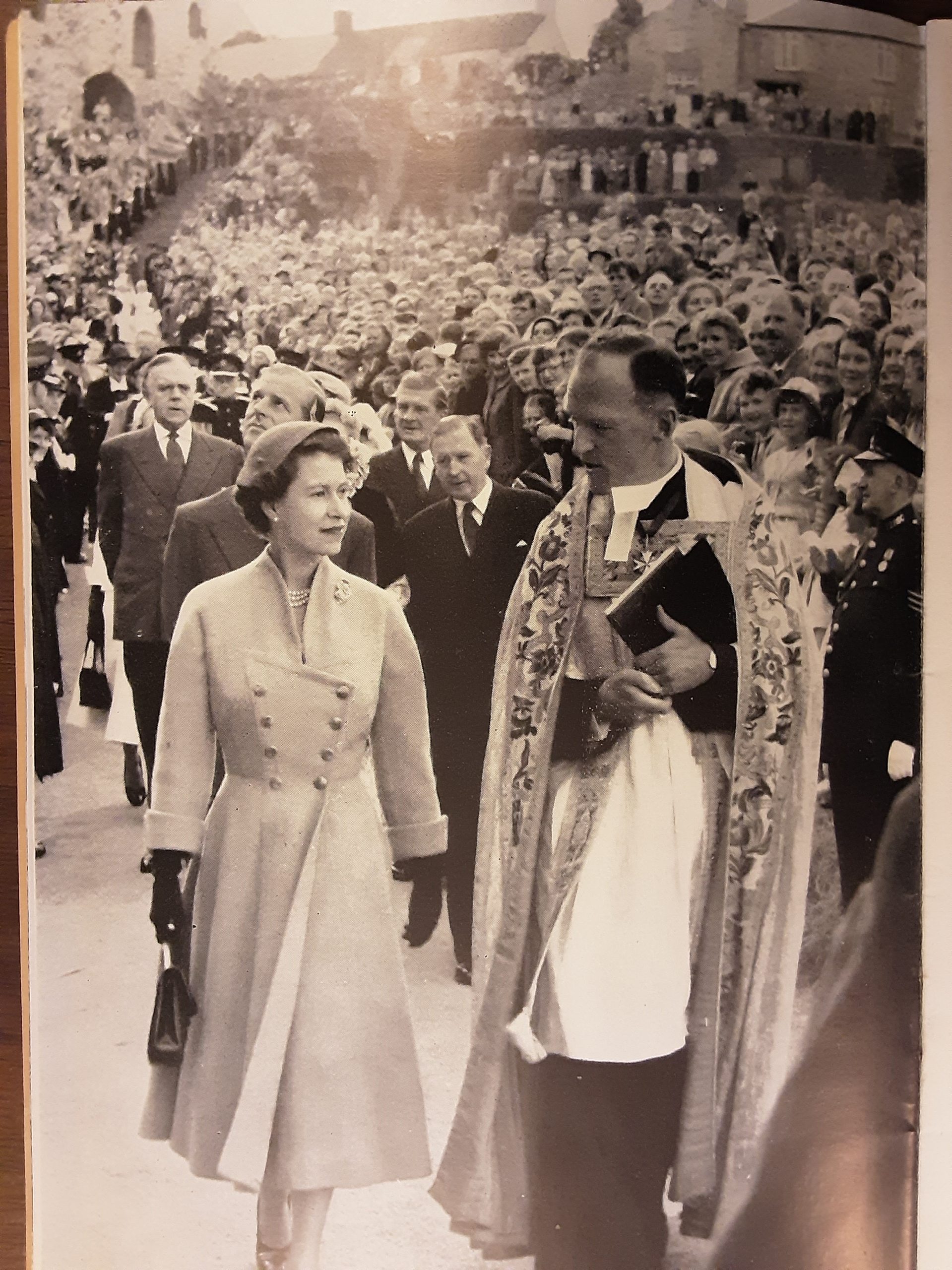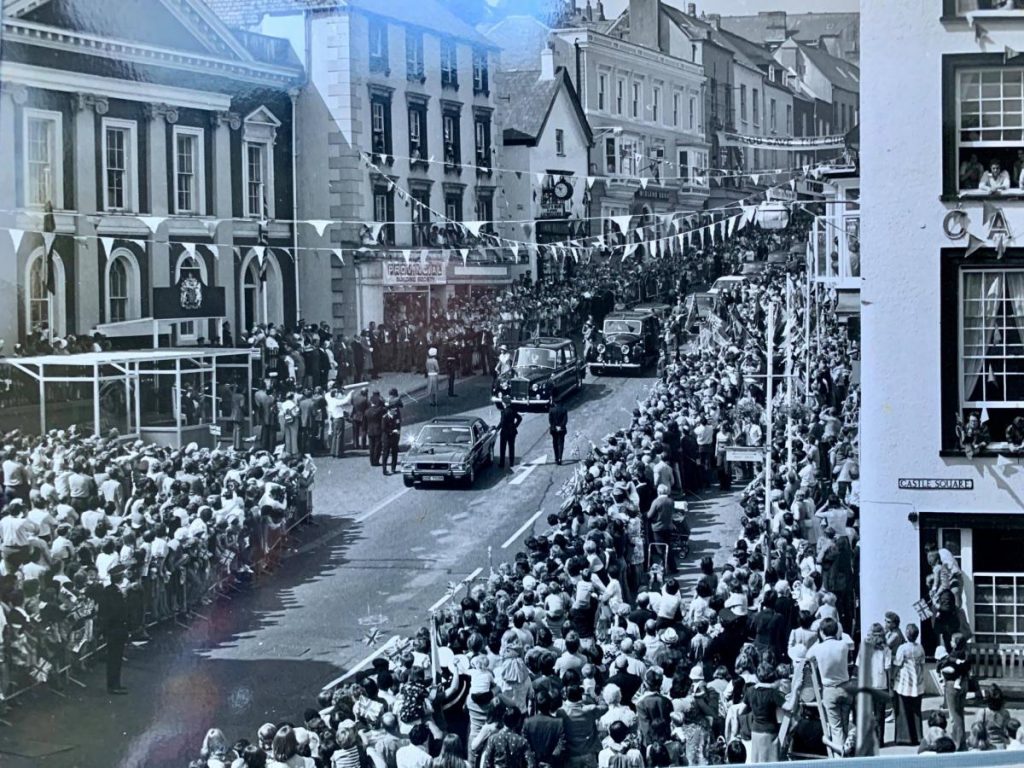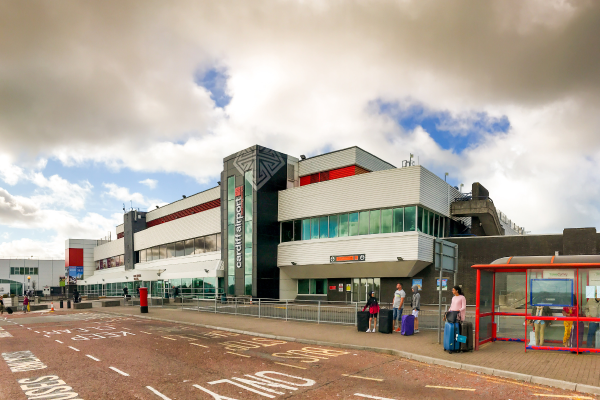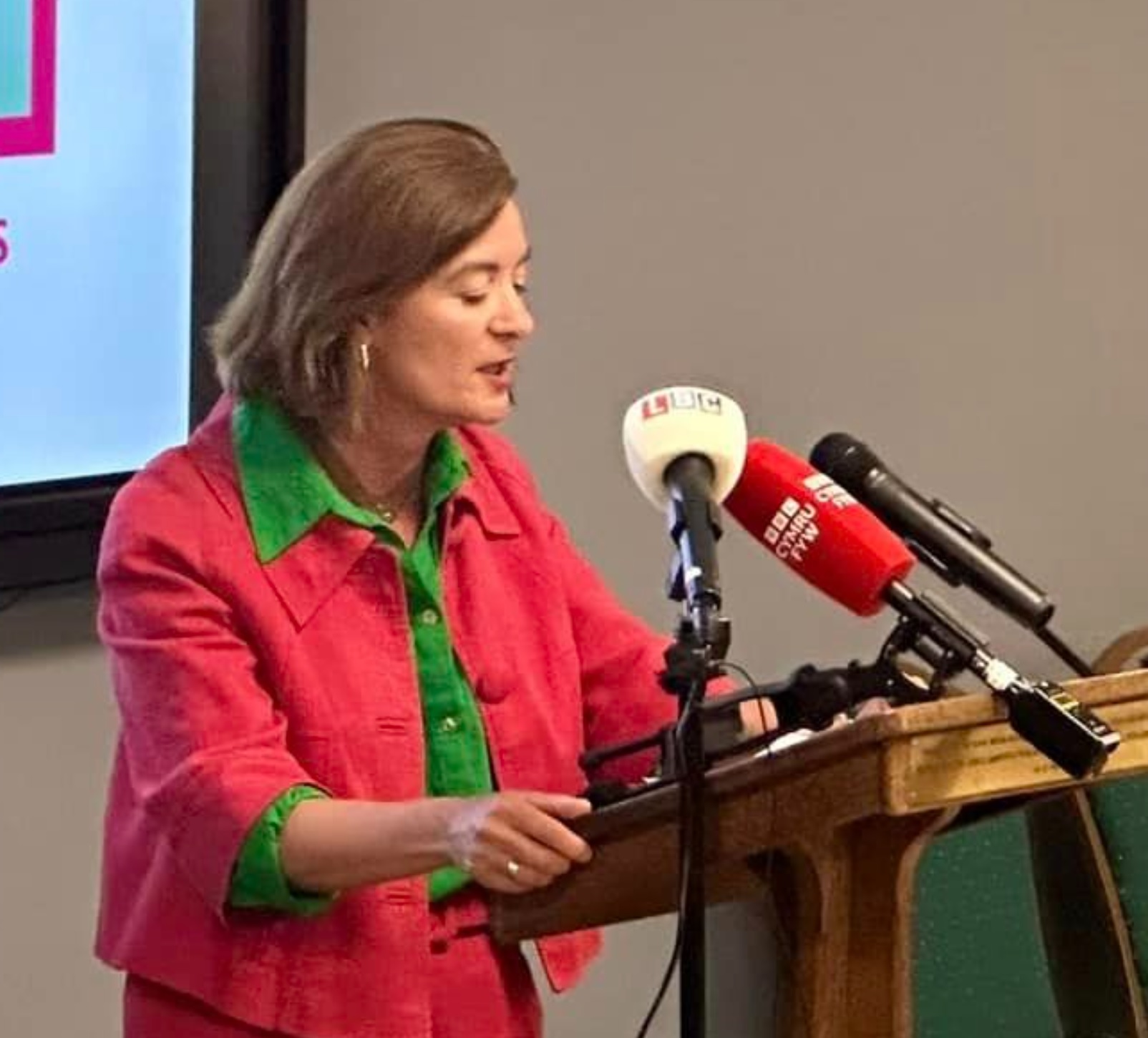News
The Queen in Pembrokeshire

OVER the course of her long reign, it would be a stretch to say Queen Elizabeth II was a regular visitor to Pembrokeshire.
However, from her first official visit in 1955 to her final one in 2014, she would see how Pembrokeshire changed over the decades.
When she arrived at the River Cleddau on the Royal Yacht Britannia in 1955, the waterway looked much different than it does today.
When the royal children Charles and Anne disembarked to visit the beach at Lindsway Bay, they enjoyed a different view than modern visitors.
Instead of refineries, the relics of Second World War radar and aircraft stations fringed the estuary, and farmland sloped down to the river on either side.
The Royal Dockyard at Pembroke Dock closed in 1926 but still housed 210 Squadron of the RAF and the iconic Sunderland aeroplanes, a legacy of the War when the town was home to the largest operational base for flying boats in the world.
Pembrokeshire’s population fell after the War. The economy was still rural, and there was little heavy industry. The main towns retained their historical character, still littered with evidence of some’s medieval origins and their nineteenth-century expansion.
During the three-day visit, apart from Pembroke Dock, the Queen visited Dale, Neyland, Haverfordwest, Pembroke, and the cathedral city of St Davids.
When the Queen and Prince Philip returned to Pembrokeshire three years later, the Haven’s age of oil was just starting.
The coming of modern industry would change Pembrokeshire forever.
In 1960, Prince Philip attended the official opening of the ESSO refinery; within five years, the Regent refinery was online.
By the time of the Queen’s next official visit in 1968, the Haven would be much changed.
Construction of the “new” Pembroke Power Station was well underway. Her Majesty toured the new, state-of-the-art Gulf Refinery.
When she returned nine years later to mark her silver jubilee, Pembrokeshire’s oil industry was already at the start of its long and slow decline.
On June 7, the County’s streets thronged with people celebrating the Silver Jubilee at street parties that sometimes stretched long into the evening.
During the gloriously sunny weather that accompanied her visit on June 23, the Queen travelled to Milford Haven and Haverfordwest while crowds filled the streets as the royal motorcade whisked her through Pembroke Dock en route to the County’s two largest towns.

Well-wishers packed Haverfordwest’s High Street fifteen-deep on either side as the royal party visited the town’s Shire Hall.
During her visit to Milford Haven the same day, the royal party could reflect on how the town had rapidly expanded as industry overtook the town’s fishing industry.
By 1982, the old certainties had faded further.
The early 1980s recession hit Pembrokeshire hard. While the revamp of the now-Texaco refinery provided short-term relief from the oil industry’s decline, the County the Queen visited in 1982 was in a worse economic situation than it had been since the 1950s.
Even during the salad days of refinery building, unemployment remained stubbornly above the national average. Now, Pembrokeshire was under the cosh.
Crowds still turned out in large numbers on Haverfordwest High Street as the Queen strolled down it flanked by flagbearers from the Royal British Legion.
The 1982 visit was particularly notable for being the first time the Queen awarded the traditional Maundy Money in Wales.
The BBC broadcast the ancient ceremony live from St Davids Cathedral, where the city centre and cathedral close were packed with onlookers trying to get a glimpse of the monarch.
The broadcast can still be viewed on YouTube. While the commentary borders on the comically reverent, the public’s enthusiasm remains clear.
In 1995, the Queen arrived in Solva on the Royal Yacht Britannia, having sailed from Cornwall.
During her visit, she re-conferred the city status on St Davids it had lost in 1886.
The trip was planned months in advance, and the visit’s purpose was its ceremonial aspect.
However, the Queen changed the programme to travel to Haverfordwest and meet the wives and children of five servicemen from the Royal Welch Fusiliers (based at Brawdy and of which she was Colonel-in-Chief) held hostage in Bosnia during the Balkan wars.
The tone of the coverage is markedly less reverential than thirteen years before, and the vox pops notably less strained and affected in tone.
In 2001, the Queen and The Duke of Edinburgh arrived at Haverfordwest Station. They travelled to St David’s Cathedral to open the restored Porth-y-Twr (gatehouse).
In the afternoon, she opened County Hall, Haverfordwest, and later visited Pembroke Dock Community School and officially opened it.
Afterwards, the Queen and The Duke of Edinburgh attended a Garden Party at Pembroke Castle before being whisked off to the next round of royal engagements.
In 2014, and always a keen horsewoman, The Queen visited Cotts Farm Equine Hospital at Robeston Wathen, where she was greeted by Narberth Scouts, before heading to one of Pembrokeshire’s business success stories at Prince’s Gate, Tavernspite, where she witnessed the production of the spring water that made the company’s name in the company of children from Tavernspite and Templeton schools.
The Queen and Prince Philip ate lunch at Picton Castle before heading to Pembroke Dock, her first landing point in Pembrokeshire almost sixty years before.
Having lived through so much of history, the Queen’s return to the town book-ended her visits to our County.
In 1955, Pembrokeshire was still emerging from the end of the Second World War.
Her Majesty saw the tail end of the County’s military connections and the dawning of industry.
Returning in 2014, she opened a heritage centre which memorialises the past through which she lived and saw the beginnings of a new economic direction for the County as it looked to the sea and tide for energy instead of oil.
From pastoral to industrial and post-industrial, ceremonial to personal to embodying a living heritage, the Queen saw Pembrokeshire over seven decades.
And those who saw her while she was here won’t forget their experiences.
News
Paris in February made easy with special direct Air France flights from Cardiff

TRAVELLING to Paris has never been simpler for Welsh holidaymakers, with Air France launching a series of special direct weekend services from Cardiff Airport to the French capital this month.
The limited-period flights offer a convenient, non-stop journey of under two hours to Paris, giving passengers more time to enjoy the city’s culture, cuisine and famous landmarks without the hassle of connections or long road transfers to other UK airports.

Timed perfectly for winter city breaks and Valentine’s getaways, the services run between February 13 and February 16, making them ideal for long weekends.
February is widely considered one of the best times to visit the French capital, with fewer crowds and a relaxed, romantic atmosphere. Visitors can explore world-famous attractions including the Eiffel Tower, the Arc de Triomphe and Notre-Dame Cathedral, browse galleries at the Louvre and Musée d’Orsay, or simply enjoy cafés, bistros and Michelin-starred dining across the city.
With Valentine’s Day falling during the operating period, the flights offer couples an easy escape for scenic walks along the Seine, memorable meals and classic Parisian experiences.
Jon Bridge, CEO of Cardiff Airport, said: “We’re delighted to offer direct flights to such a vibrant city for Valentine’s weekend. Cardiff Airport is expanding its reach, giving customers an easy, friendly travel experience and fantastic options. We’ve listened to passenger demand and are excited to make this opportunity possible, with more to come from Cardiff.”
Seats are available now via airfrance.co.uk and through travel agents. As availability is limited, early booking is recommended.
Flight schedule
Cardiff (CWL) to Paris (CDG)
• Feb 13 – AF4149 – 6:20pm → 8:50pm
• Feb 14 – AF4149 – 3:20pm → 5:50pm
• Feb 15 – AF4149 – 9:20am → 11:50am
• Feb 15 – AF4151 – 9:00pm → 11:30pm
• Feb 16 – AF4149 – 9:20am → 11:50am
• Feb 16 – AF4151 – 5:50pm → 8:20pm
Paris (CDG) to Cardiff (CWL)
• Feb 13 – AF4148 – 5:00pm → 5:30pm
• Feb 14 – AF4148 – 2:00pm → 2:30pm
• Feb 15 – AF4148 – 8:00am → 8:30am
• Feb 15 – AF4150 – 7:40pm → 8:10pm
• Feb 16 – AF4148 – 8:00am → 8:30am
• Feb 16 – AF4150 – 4:30pm → 5:00pm
Education
Language commissioner launches probe into school closure impact on Welsh

THE WELSH Language Commissioner has launched a formal investigation into claims that the proposed closure of a rural Carmarthenshire primary school did not properly assess the impact on the Welsh language.
Campaign group Cymdeithas yr Iaith confirmed this week that the Welsh Language Commissioner will examine whether Carmarthenshire County Council complied with its legal duties when producing a language impact assessment linked to plans to close Ysgol Llansteffan.
The council issued a statutory notice last year proposing to shut the village school at the end of the summer term as part of wider education reorganisation. A final decision had been expected this spring.
However, the investigation now creates fresh uncertainty over the timetable.

Complaint over ‘insufficient assessment’
Cymdeithas yr Iaith says it submitted a formal complaint arguing that the council failed to produce a sufficiently detailed assessment of how the closure could affect Welsh-medium education and the wider Welsh-speaking community.
The group claims the authority selectively used data to support closure rather than examining all available evidence objectively.
Two key concerns were raised.
Firstly, campaigners argue there may not be enough places in neighbouring Welsh-medium schools to accommodate pupils from Llansteffan and nearby housing developments, potentially forcing some families into English-medium provision.
Secondly, they say the assessment did not meaningfully consider the school’s role as a community hub or explore ways the site could generate income and support local Welsh-language activities.
On behalf of local members, Ffred Ffransis said: “There will not be places for all the Llansteffan children, nor for the children of the new housing estates, in other Welsh-medium schools in the area.
“The most cost-effective way of providing sufficient places locally in Welsh-medium education is by keeping open Ysgol Llansteffan and making better use of the buildings, including environmental education and community use.”
Formal investigation
In a letter to the group, the commissioner confirmed an investigation will be held under Section 71 of the Welsh Language Measure to determine whether the council complied with Welsh language standards.
The probe could take up to three months.
Campaigners believe this may delay implementation of the closure and could require the council to revisit its assessment and potentially carry out a fresh statutory consultation.
Ffransis said: “Even if the council now decided to make a full and meaningful assessment, there would likely have to be a new consultation. The original decision may have been taken on a faulty basis.”
He added that similar concerns had been raised about language impact assessments connected to other proposed school closures in the county.
Council position
The council has previously said that school reorganisation proposals are driven by falling pupil numbers, financial pressures and the need to ensure sustainable, high-quality education.
Authorities across Wales have faced difficult decisions in recent years as rural rolls decline and building maintenance costs rise.
It is expected the council will respond formally to the commissioner’s investigation in due course.
What happens next
If the commissioner finds that language standards were not properly followed, enforcement steps could be taken and the process delayed or revisited.
For families in Llansteffan, the outcome may determine whether their local Welsh-medium school remains open beyond the summer term.
The Herald has contacted Carmarthenshire County Council for comment.
Further updates will follow as the investigation progresses.
Business
First Minister criticised after ‘Netflix’ comment on struggling high streets

Government announces 15% support package but campaigners say costs still crushing hospitality
PUBS, cafés and restaurants across Wales will receive extra business rates relief — but ministers are facing criticism after comments suggesting people staying home watching Netflix are partly to blame for struggling high streets.
The Welsh Government has announced a 15% business rates discount for around 4,400 hospitality businesses in 2026-27, backed by up to £8 million in funding.
Announcing the package, Welsh Government Finance Secretary Mark Drakeford said: “Pubs, restaurants, cafés, bars, and live music venues are at the heart of communities across Wales. We know they are facing real pressures, from rising costs to changing consumer habits.
“This additional support will help around 4,400 businesses as they adapt to these challenges.”
The announcement came hours after Eluned Morgan suggested in Senedd discussions that changing lifestyles — including more time spent at home on streaming services — were contributing to falling footfall in town centres.
The remarks prompted political backlash.
Leader of the Welsh Liberal Democrats, Jane Dodds, said: “People are not willingly choosing Netflix over the high street. They are being forced indoors because prices keep rising and wages are not.
“Blaming people for staying at home is an insult to business owners who are working longer hours just to survive.”
Industry groups say the problem runs deeper than consumer behaviour.
The Campaign for Real Ale (CAMRA) welcomed the discount but warned it would not prevent closures.
Chris Charters, CAMRA Wales director, said: “15% off for a year is only the start. It won’t fix the unfair business rates system our pubs are being crushed by.
“Welsh publicans need a permanent solution, or doors will continue to close.”
Across Pembrokeshire, traders have repeatedly told The Herald that rising energy bills, wage pressures and rates — rather than a lack of willingness to go out — are keeping customers away.
Several town centres have seen growing numbers of empty units over the past year, with independent shops and hospitality venues reporting reduced footfall outside the main tourist season.
While ministers say the relief balances support with tight public finances, business groups are calling for wider and longer-term reform.
Further debate on rates changes is expected later this year.

-

 Health6 days ago
Health6 days agoConsultation reveals lack of public trust in health board
-

 News7 days ago
News7 days agoCaldey still unsafe, survivors warn — despite Abbey’s reform claims
-

 Community7 days ago
Community7 days agoPembrokeshire students speak at national Holocaust Memorial Day event
-

 News22 hours ago
News22 hours agoPrincess of Wales visits historic Pembrokeshire woollen mill
-

 News7 days ago
News7 days agoKurtz raises Gumfreston flooding in the Senedd as petition deadline nears
-

 Crime5 days ago
Crime5 days agoPembroke man accused of child sex offences sent to Swansea Crown Court
-

 Education7 days ago
Education7 days ago‘Vulnerable teen’ questioned by police at Milford Haven School
-

 Education7 days ago
Education7 days agoAttendance concerns at Milford School reflect wider issue raised at the Senedd






























